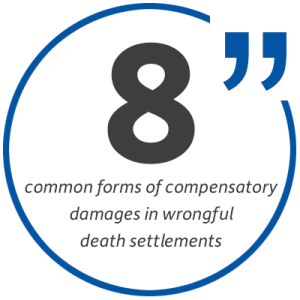Losing a family member or spouse is one of the most traumatic experiences a person can face. And when that loss is due to the negligence or intentional harm of another party, the pain and devastation can be even greater.
If you’ve lost someone, recovering a wrongful death settlement can reimburse you for out-of-pocket expenses and compensate you for your loss. While no amount of money can truly make up for the loss of a loved one, a fair and just settlement can help the family move forward and begin the healing process.
A common question that many have regarding these damages is whether or not a wrongful death lawsuit settlement is taxable. In this blog, we’ll dive into types of wrongful death damages and answer the question, “Is a wrongful settlement taxable?”
Are Wrongful Death Settlements Taxable?
Whether or not you should expect to pay taxes after recovering a wrongful death settlement will depend on the type of damages you receive. In general, wrongful death settlements are not typically taxable at the federal level because the IRS doesn’t tax compensatory damages, meaning damages intended to reimburse victims. Unfortunately, there are some exceptions that we’ll discuss in detail below.
Although the IRS will usually not tax compensatory damages, you’ll likely need to pay taxes on non-compensatory damages.
What’s the Difference Between Compensatory and Non-Compensatory Damages?
Compensatory damages are intended to compensate the plaintiff for their losses, while non-compensatory damages — also called punitive damages — are intended to punish the defendant for their actions and to deter others from engaging in similar behaviors.
The IRS doesn’t consider compensatory damages as income, so you typically won’t need to pay taxes on damages that reimburse you and your family in some way.
Some common forms of compensatory damages in wrongful death settlements include:

- Funeral and burial costs: The decedent’s family should receive compensation for expenses associated with the victim’s funeral and burial.
- Medical bills: If the victim received medical attention before their death, their family should be able to recover money reimbursing them for all associated medical expenses.
- Loss of income: If family members relied on the victim’s income, they can seek damages for their loss of financial support.
- Loss of inheritance: Those seeking damages for lost inheritance may be able to recover the money that the victim would have saved and left for their family if they hadn’t died unexpectedly.
- Pain and suffering: Refers to the physical and mental pain and suffering that the victim experienced before passing away or that of the surviving family.
- Loss of consortium: These damages compensate a victim’s spouse or partner for the loss of companionship.
- Loss of a parent: Refers to the damages awarded to a victim’s family for losing the guidance and support of a parent.
- Mental anguish: The victim’s family may be able to recover compensation for the mental and emotional suffering they face as a result of their loss.
Punitive Damages
Unlike other forms of damages, punitive damages are meant to punish the plaintiff rather than compensate victims, and these non-compensatory damages are considered income.
Let’s examine the example of a large company negligently releasing a hazardous product, such as faulty airbags. If someone dies as a direct result of the faulty product, the victim’s family may be able to recover wrongful death damages from the company. The judge may award the victim’s family with punitive damages on top of compensatory damages. These damages are meant to punish the negligent company and to dissuade other companies from engaging in similarly reckless behaviors.
Punitive damages are far more rare than other forms of damages, and those seeking punitive damages must prove that the defendant was especially reckless or intentionally caused harm.
When Do You Pay Taxes On Wrongful Death Settlements?
Although wrongful death settlement recipients usually do not need to pay taxes on compensatory damages, there are some important exceptions:
- Tax Deductions: If you paid out of pocket for any medical bills and other expenses, you may have claimed a tax deduction. If you receive compensation for these out-of-pocket expenses, you will need to reimburse the IRS for your deductions.
- Accrued Interest: If part of your wrongful death settlement accrues interest over time, the IRS will likely consider that interest as income, meaning you will be responsible for paying taxes.
Contact a Wrongful Death Attorney
If you’ve lost a loved one due to another party’s negligence or deliberate wrongdoing, you need to do everything you can to ensure you receive the compensation you deserve, and you need to hold the responsible party accountable for their wrongdoing.
You can greatly increase your chances of maximizing your settlement by enlisting the help of a wrongful death attorney, as they can help you gather and present evidence against the negligent party and can negotiate on your behalf.
For a team of experienced wrongful death attorneys in Indianapolis, contact Crossen Law Firm. Call us today at 317-401-8626, or you can contact us online here.

 317-401-8626
317-401-8626 
.jpg)